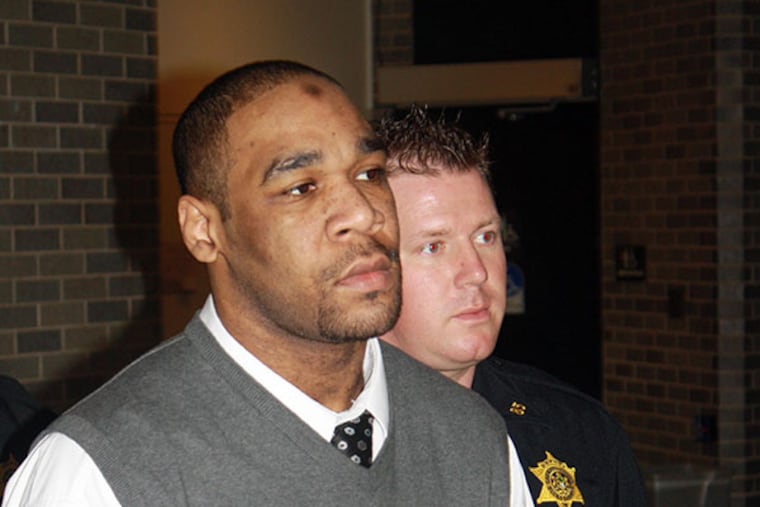Omar Sharif Cash sentenced to death
PHILADELPHIA For years, Omar Sharif Cash honed a reputation for increasingly violent crimes and escaping prosecution. Cash's criminal career ended in spring 2008, in a violent three weeks when he killed a Philadelphia man and, while on the run, carjacked a Bucks County couple, and killed the man and raped his fiancee. He was arrested shortly afterward.

PHILADELPHIA For years, Omar Sharif Cash honed a reputation for increasingly violent crimes and escaping prosecution.
Cash's criminal career ended in spring 2008, in a violent three weeks when he killed a Philadelphia man and, while on the run, carjacked a Bucks County couple, and killed the man and raped his fiancee. He was arrested shortly afterward.
On Friday, it took a Philadelphia jury of 10 women and two men barely 90 minutes to sentence Cash to death by lethal injection for the execution-style slaying of a man polishing his car outside a Frankford car wash.
Cash, 31, head cocked slightly to one side, blinked rapidly and drew his mouth into a half-grimace, half-smile as he heard the jury's decision.
Cash did not apologize for or comment on the April 21, 2008, murder of 19-year-old Muliek Ronald Brown before being formally sentenced by Common Pleas Court Judge Sandy L.V. Byrd.
It was the first Philadelphia death sentence since Feb. 29, 2012, when a jury sentenced Derrick White, 23, for the 2010 murder of basketball coach Abdul Taylor to prevent Taylor from testifying. White is currently at Greene state prison in western Pennsylvania.
Brown's killing was seen by several people and caught by a video camera at Winning Edge Car Wash on Frankford Avenue. Brown was polishing the wheel rims of his Mercury Marquis when Cash came up and shot him in the back of the head.
Cash testified that he shot Brown in a case of "kill or be killed," as Brown and other members of a local gang were hunting him and had shot at him, he said.
Assistant District Attorneys Carlos Vega and Peter Lim called Cash's version a fabrication. They said there was no evidence Brown, or anyone else, had shot at Cash. Brown had no criminal record, worked full time, was married, and had a young son.
Under Pennsylvania law, Cash's conviction and sentence are automatically appealed to the state Supreme Court.
Cash will be transferred to the state prison in Rockview, where executions take place, and confined to a cell for 23 hours a day.
Cash's death sentence is the third in Pennsylvania this year. Westmoreland County juries imposed two death sentences.
There are 191 people - 188 men and three women - awaiting execution in Pennsylvania prisons. Since capital punishment was reenacted in the state in 1978, only three people have been put to death, all in 1995 and only after they halted their appeals and asked for death.
Attorney Earl G. Kauffman, who, with Lee Mandell defended Cash, said Cash rejected prosecution plea offers that would have spared his life.
During the weeklong hearing at which the jury heard evidence to determine if Cash should be executed or spend life in prison, Cash seemed to do his best to show his contempt.
He refused to change out of his blue prison shirt, slumped in his chair, and cleaned his nails.
"We did everything we could," Kauffman said, referring to negotiations between defense and prosecution. "The only person who stopped us from de-deathifying this case was him."
Kauffman urged the jury to sentence Cash to life without parole, citing his "atrocious childhood" - abusive alcoholic-drug using parents, abandoned at age 6, and in a detention facility by 10.
The jury acknowledged Cash's upbringing but said it did not outweigh his long history of violent crime warranting the death penalty.
"I thank God that justice was served," said Brown's grandmother Lenora Barnes, 57. "We can sleep now. It feels like the weight of the world has been lifted off us."
Cash was almost legendary in law enforcement for escaping conviction. A 2009 Inquirer series detailed how a rape case against him was dismissed when the victim failed to appear at trial, an attempted-murder case failed when the victim hanged himself, and a robbery case ended when the alleged victim fled.
Cash's streak ran out in 2010 when a Bucks County jury convicted him of first-degree murder in the May 2008 kidnapping and killing of immigrant carpenter Edgar Rosas-Gutierrez, 32, while Cash was on the lam from the Brown killing.
Cash shot Rosas-Gutierrez and dumped his body along a Bensalem highway. He then took the victim's 41-year-old fiancee to a Lawrenceville, N.J., motel, and repeatedly raped her.
The Bucks jury spared Cash's life, sentencing him to life without parole.